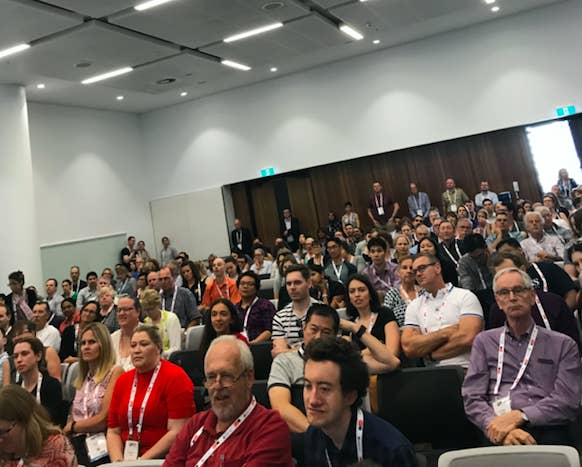
Any perception that Australian GPs weren't interested in learning about and prescribing medicinal cannabis was silenced on Saturday, as doctors flooded into the International Convention Centre Sydney to discuss cannabis and its future in the country.
On the last day of GP17, a three-day event hosting dozens of sessions on the future of medicine in Australia, standing room was the final option as the morning's session on "hashing out the facts" about medicinal cannabis began.
Four spectacled men were on the session's panel: pain specialist professor Milton Cohen; Dr. Tony Gill from the Therapeutic Goods Administration (TGA); neurologist Dr. John Lawson; and ANU Medical School's Dr. David Caldicott.
The session began with a discussion on the progress of the drug in the medical space, with the TGA's Gill saying there was not strong evidence yet to support medicinal cannabis, but that further studies and reviews will be published soon.
Cohen said he believed cannabis use did not result in any significant treatment of pain — "Many patients were still suffering after six years of use" — and that there was limited evidence supporting medicinal cannabis use over other medication.
It wasn't until self-professed "antichrist" of the event, Dr. David Caldicott, spoke that medicinal cannabis was heralded as a possible solution to health problems. Caldicott's rapid presentation focused on the inaccessibility of the drug in Australia, despite its legal status, and claimed the country's medical bodies were "laggards in the space".
Caldicott said there was conclusive and substantive evidence from studies originating out of "some place called Harvard", and pointed out the fact that fewer opioids were prescribed in states in the US where the drug was legal, with a 30% reduction in mortality rates linked to opioid use.
At the end of the session, many of the GPs in attendance asked questions prefaced with the admittance that they knew very little about the drug.
Prominent GP Brad McKay was clapped after a frustrated statement hidden as a question, where he complained that there was little easy-to-understand information available that doctors could use to determine if their patient qualified for medicinal cannabis use.
"Let's say I have a patient whose pain is a 6/10," McKay told BuzzFeed News after the event. "If medicinal cannabis use takes that down to a five, and it means the patient can go from not being able to vacuum their house to suddenly being able to, then isn't that worth it?"
In March, Caldicott was at a meeting of global regulators in Sydney, with representatives from Israel, Canada, the Netherlands and Germany, as well as the NSW chief scientist Mary O'Kane.
After discussing Australia's place in the medicinal cannabis movement, the progressive Israeli reps were asked if there was anything about Australia's progress they were impressed with. "Well," they replied. "You spelled marijuana right."
